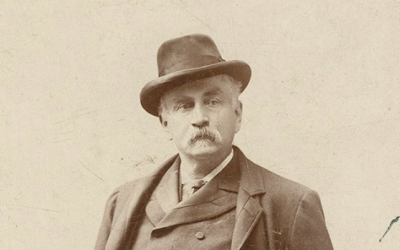Charles Henry Gere received his education in Pennsylvania, studied law in Baltimore, and served in the Civil War before coming to Nebraska in 1865. The New York native soon became a partner of David Butler in a law office in Pawnee City. When Butler became the state’s first governor in 1867, Gere served as his private secretary.
Gere, a Republican, was a powerful force in the establishment of the new state of Nebraska and of the city of Lincoln. He was one of the leaders in the movement to ratify the action of the Capital Commission in concentrating state institutions in one place, rather than scattering them in different cities. He served in the first session of the legislature, which convened July 4, 1866, in Omaha; and later served two terms in the State Senate, 1869-70 and 1881-82. In 1875 Gere served as a delegate to the state constitutional convention. As a member of the education committee, he introduced a bill which founded the state university, and beginning in 1881, he was a member of the Board of Regents, serving as its president for ten years. Gere influenced the passage of legislation which helped establish and maintain free public libraries in Nebraska.
Gere was a member of the committee on railroads, which sponsored a bill appropriating money for railroads within the state. Two years later, sections of four railroad systems were being built, with Lincoln on each one’s route. Gere served on the railroad commission soon after its founding in the 1880s. He had served as Pawnee County prosecuting attorney at Pawnee City and later became county attorney for Lancaster County.
Gere founded Lincoln’s first newspaper, The Nebraska Commonwealth (later the Nebraska State Journal) in 1867. When the State Journal became a daily in 1870, Gere left the practice of law and became more actively involved in the newspaper. He was responsible for the controversial editorial position of the State Journal, taking a stand against the Farmers Alliance and its candidates. His editorial in the Journal on September 14, 1890, stated that Alliance members “are to Nebraska what a herd of hogs would be in the parlor of a careful housekeeper”–words long remembered in Nebraska politics. Gere died in Lincoln on September 30, 1904.



